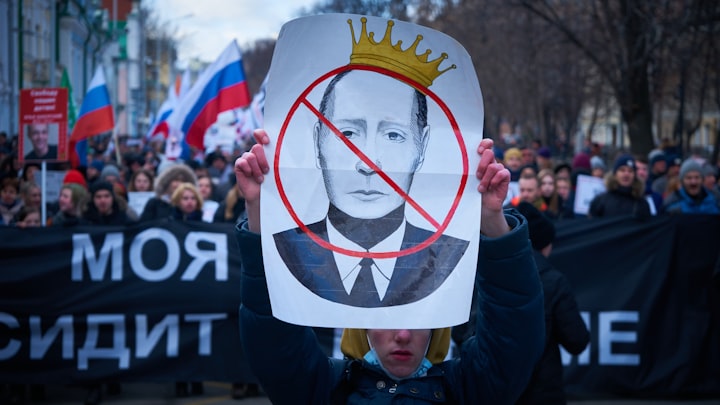What Does Vladimir Putin Really Want?
The strongman is playing out his nostalgia for Soviet power in Ukraine

As Vladimir Putin masses military materiel and hundreds of thousands of troops along the Russian-Ukrainian frontier, the Russian leader is threatening to engulf the remainder of sovereign Ukraine, following his 2014 seizure of Crimea. The West is trying to understand the black hole at the center of the Kremlin’s opaque decision making, and it is failing miserably. Like a Matryoshka doll, the answer is hidden just beneath the surface.
The wily KGB colonel is playing an old and deadly game first undertaken by Czarina Catherine the Great when her armies first conquered Ukraine and brought it under the Russian yoke in 1793, and this remains that same essential game of Empire today, despite the long lapse of time.
The Czarist claim to rule over the vast frozen expanse of Russia was always predicated on the Romanov dynasty’s ability to deliver military and foreign policy victories for Russia throughout Eastern Europe and Central Asia, and it is that same martial impulse that is guiding Putin toward what will be a devastating conflict in Ukraine, should he pursue it.
As Putin scores victories abroad, his political power increases in parallel at home. It is the same calculus that has been deployed for centuries by Russian leaders to secure their tenuous grip on power at home.
A national nightmare
The political and military domination of Ukraine by Russian leaders continued into the ensuing centuries following Catherine the Great’s annexation, from the era of the Czars into communist rule by the Bolsheviks. Soviet Generalissimo Joseph Stalin used Ukraine to supply the bread to feed his rapidly industrializing Russian cities, and this combined with his genocidal war against the landed peasants, or Kulaks, leading to unimaginable famine gripping the Ukrainian countryside.
This was an apocalyptic if overlooked episode in world history, the Holodomor, in which perhaps 4 million Ukrainians died gruesomely slow deaths at the hands of a cruel Soviet state that systematically stole all the grain and seeds from Ukraine’s peasant farmers, mercilessly leaving them to starve and die in their millions. Stalin’s brutal and omnipresent KGB (later Putin’s employer, renamed FSB) arrested, imprisoned, and murdered those Ukrainians who dared resist this outrage by hiding food or speaking out.
This was a nightmarish campaign of mass starvation and prolonged and murderous repression against a national minority Stalin considered politically unreliable, and it was carefully concealed from observers and journalists, many of whom were in thrall to communist ideals and willing to spout Soviet propaganda. As Putin prepares his invasion, it’s critical the West comprehends how this dark history of ruthless subjugation fuels Ukraine’s thirst for national and political independence today.
Blood and treasure
Putin’s surprisingly popular rule in Russia is built on several basic components: fervent nationalism and the Russian Orthodox Church, a potent political brew that would’ve been deeply familiar to any of the ruling Czars. Third, Putin’s claim to power is animated by a revisionist longing to recapture the Soviet Union’s old regional hegemony and its unquestioned global might abroad.
There is deep nostalgia for the majesty of Soviet statehood that revels in the way Russia dominated her European neighbors politically, and endlessly preoccupied rival leaders in the United States and around the world militarily. Putin feels this personally and intensely, famously calling the collapse of the Soviet Union “the greatest geopolitical catastrophe of the century.”
All this makes the invasion of Ukraine a tempting prize for Putin, who has found his autocratic rule softening somewhat in recent years inside Russia, as the economy slumps, and as his political opposition grows more brazen.
As it is, Putin’s most dynamic political opponent, Alexei Navalny, is a domestic headache. Putin has been forced to adopt various measures to contain his growing political influence, even as Navalny’s organization publishes closely held secrets about Putin’s extravagant Black Sea palaces, his undisclosed family, and the absurd wealth of his kleptocratic oligarchs.
After barely surviving poisoning at the hands of the FSB in Siberia, Navalny was whisked off to Germany for medical treatment. When Navalny returned to Russia he was promptly arrested, and he remains imprisoned there today. His presence is a constant source of irritation for the Kremlin, and his political organization has been outlawed as an extremist group inside Russia.
This is a portrait of an aging leader, one who’s been in power for over two decades and one who feels increasingly threatened from within by the gathering of popular political forces arrayed against his sclerotic dictatorship. His successful meddling in the 2016 election in the United States was impressive, though annexing Ukraine would be a far greater accomplishment to his domestic audience.
Vladimir Putin needs big political wins. It’s just that simple.
Indeed, this buildup on the border is a manufactured crisis designed to make Putin appear the victorious statesman at home, and he has already squeezed a virtual summit with President Biden out of it, satisfying his unquenchable thirst for relevance in world affairs with this presidential tête-à-tête.
Yet with a flagging pandemic-addled economy built on sinking oil and gas prices, alongside increasingly muscular opposition movements inside Russia, it may make sense to invade Ukraine, if only for Putin to shore up his own domestic power base.
As has been drily noted among political observers of Russia, the only way Vladimir Putin is coming out of the Kremlin is in a pine box. If he believes invading Ukraine will strengthen his weakening position at home, he won’t hesitate to act, despite what is sure to be a cataclysmic European war.
Revisionist nationalism
Putin’s desire to resurrect lost Soviet power from the ash heap of history, together with Ukraine’s loathing of Russian domination over the centuries, assures that any potential conflict will be both protracted and bloody, likely devolving into guerrilla warfare in cities and towns across Ukraine after any victory by admittedly far superior Russian forces.
Ukrainians are eager to move politically and economically closer with the West, and to embrace European democratic values rather than Russian autocracy, while Putin wants to dominate their country for his own craven political interests, destroying this budding national consciousness under the boot heel of the Russian military.
It is thought to be the enduring prerogative of Great States to bring their immediate territorial realms under their control by force, if necessary, and Putin views Ukraine as merely a rebellious Russian colony that has escaped his remit solely by virtue of an unfortunate political technicality.
Vladimir Putin’s contract with the Russian people is this: he can embezzle with impunity from state coffers to enrich himself and his oligarch partners while conducting what are essentially one-party elections, and in return for his autocracy he must deliver both stability at home and glory abroad.
As Putin’s enemies at home grow bolder, war in Ukraine might provide him with exactly what he needs to sustain his sluggish brand of Russian nationalism inside of Russia. Tragically, that may mean immense bloodshed and suffering for the Ukrainian people and Russian soldiers, though it is nothing terribly new for either to pay dearly for the unsmiling vanity of Russian despots anxious to burnish the throne.
About the Creator
Alexander Ziperovich
I am an essayist, opinion columnist, and political analyst.






Comments
There are no comments for this story
Be the first to respond and start the conversation.